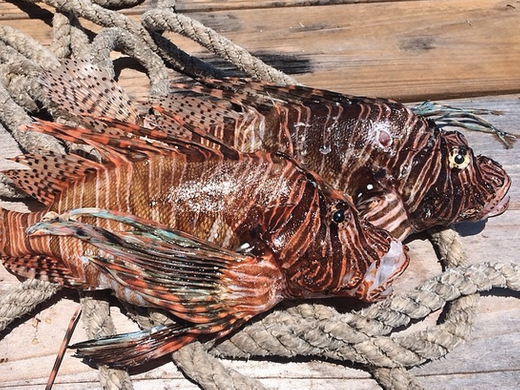Cayman in the News 3 July 2018
 That predatory silent roar underwater is the lionfish, an invasive species in the Caribbean that can devastate up to 80 percent of fish in a coral reef in a scant five weeks. Lionfish have a ferocious appetite @ their stomachs can expand to 30 times their natural size @ and have no known predators in the Caribbean
That predatory silent roar underwater is the lionfish, an invasive species in the Caribbean that can devastate up to 80 percent of fish in a coral reef in a scant five weeks. Lionfish have a ferocious appetite @ their stomachs can expand to 30 times their natural size @ and have no known predators in the Caribbean
That predatory silent roar underwater is the lionfish, an invasive species in the Caribbean that can devastate up to 80 percent of fish in a coral reef in a scant five weeks. Lionfish have a ferocious appetite — their stomachs can expand to 30 times their natural size — and have no known predators in the Caribbean
No one really knows for sure how the lionfish problem began. Some attribute it to lionfish arriving in the ballast of ships, while a second opinion points at fish aficionados dumping their aquariums into the sea.
The Chinese word for crisis is famously the same as the one for opportunity. This applies to the lionfish invasion also, with some people diving in to make a profit out of a problem.
Rachel Lynn Bowman is a commercial spearfisher of lionfish who regularly harvests along a 40-mile reef tract in the Florida Keys. She’s been selling lionfish to Whole Foods since 2016.
“Obviously, complete eradication isn’t a possibility,” said Bowman. “Managing populations in areas where other juvenile fish congregate is a very realistic goal, however. Any effort to remove lionfish from areas where native fish breed and raise young is bound to have a positive impact.”
According to Bowman, Dr. Stephanie Green has published studies showing a resurgence in local native fish populations in areas of the Bahamas where lionfish are regularly culled.
“A week ago, three friends and I speared 1,115 lionfish out of Apalachicola, Florida,” said Bowman. “We know one female lionfish can release 2 million eggs per year, and she can do that for about 13 years. If half of the fish we speared were female, then we prevented the release of 14,495,000,000 eggs. Let’s just call it an even 15 billion. I definitely consider that a dent.”
Lionfish are reef fish, which means they can’t be caught via hook or net. This makes them ideal game for divers wielding spear guns, although fishing for lionfish can be tricky. If a diver is pricked by one of the spines their hand will swell. In addition to the pros, scuba diving enthusiasts visiting the Caribbean are joining in the hunt.